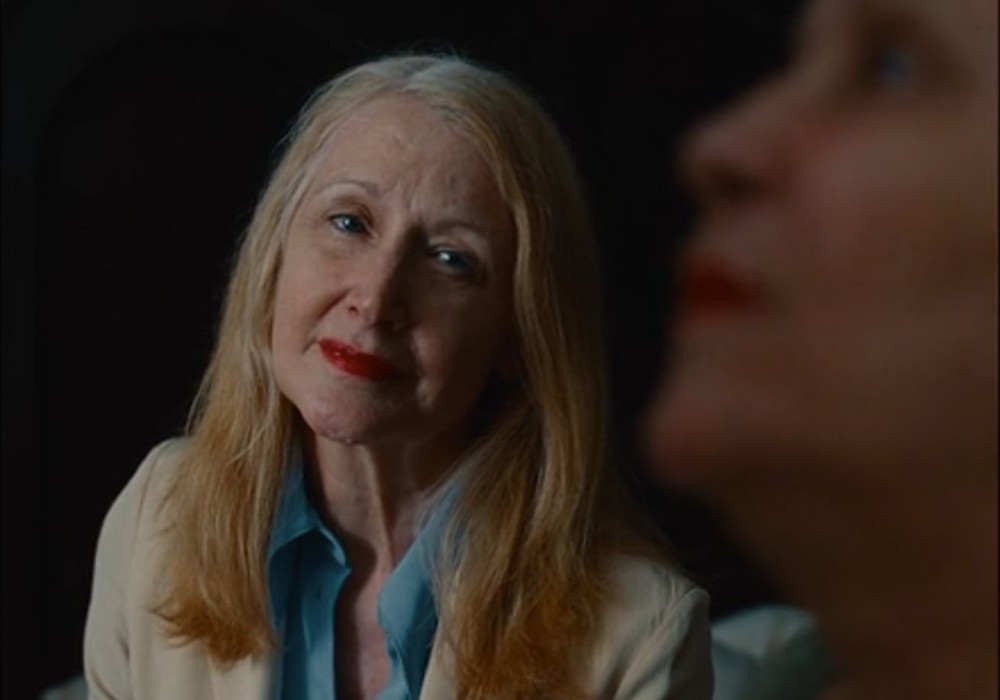
Monica is an intense, touching drama about end-of-life family reconciliation. Monica (Trace Lysette) is a glamorous thirty-something, red convertible car-driving, long auburn-haired woman living in California, having left her rural mid-Western roots behind. She works as a masseuse and an online sex worker. She’s cool and guarded, and lives a fairly singular life, having broken up with her previous partner Jimmy. She’s also estranged from her birth family, having been thrown out of her home by her mother about twenty years ago when she revealed that she was transitioning. They haven’t seen each other since then.
Then, out of the blue, Monica receives a call from her sister-in-law Laura (Emily Browning), requesting that Monica return home to help with her mother’s end-of-life care as she battles brain cancer. Monica agrees to go, although is in two minds as to how this is going to pan out.
 Her mother Eugenia (Patricia Clarkson) lives in a beautiful, somewhat neglected, old house. After a two-day road trip east, Monica arrives at the house and meets the household. Her mother’s care is split between a housekeeper/carer Leticia (Adriana Barraza), Laura, Monica’s handsome brother Paul (Joshua Close), and Monica. Eugenia doesn’t recognise Monica, due to both the brain cancer and Monica’s transition since they last saw each other, but nevertheless, Monica settles in for a long stay. At first, Monica keeps herself to herself and is quite awkward and passive. She tries to maintain her existing life routine, performing her online sex work from a spare bedroom in the house and trying to hook up with local men for dates.
Her mother Eugenia (Patricia Clarkson) lives in a beautiful, somewhat neglected, old house. After a two-day road trip east, Monica arrives at the house and meets the household. Her mother’s care is split between a housekeeper/carer Leticia (Adriana Barraza), Laura, Monica’s handsome brother Paul (Joshua Close), and Monica. Eugenia doesn’t recognise Monica, due to both the brain cancer and Monica’s transition since they last saw each other, but nevertheless, Monica settles in for a long stay. At first, Monica keeps herself to herself and is quite awkward and passive. She tries to maintain her existing life routine, performing her online sex work from a spare bedroom in the house and trying to hook up with local men for dates.
This proves difficult to sustain – Eugenia’s cries from the adjoining bedroom interrupt her sex work, men are unreliable and her car breaks down, leaving her without transport. Monica relents and slowly reconnects with her family. This is where director Andrea Pallaoro’s work really shines. He successfully captures those end-of-life moments where words are not always necessary. So much can be said by eye contact and hand touching, and it is this that makes Monica so special. Slow, dialogue-free scenes say so much. The whole family subconsciously works out how to fit Monica back in. Monica’s awkward relationship with Paul is also examined. As is so often in family situations, it’s the young children, unclouded by judgment or past history, who make such times easier. Lysette, herself a trans-woman, is excellent as Monica, giving a delicate, powerful performance. The film premiered in Venice last year and was the first film in the history of Venice to feature a trans lead actor. Clarkson and Close’s performances also shine through. The themes of family, end-of-life, and reconciliation are all the more intense for having a queer rejection back story. An impressive soundtrack includes gems by Pulp, New Order, OMD, and Erasure. Good viewing.
Queerguru’s Contributing Editor Ris Fatah is a successful fashion/luxury business consultant (when he can be bothered) who divides and wastes his time between London and Ibiza. He is a lover of all things queer, feminist, and human rights in general. @ris.fatah

